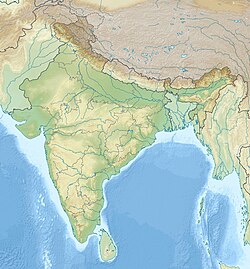Chandrashila
This article contains instructions, advice, or how-to content. (March 2018) |
| Chandrashila | |
|---|---|
 | |
| Highest point | |
| Elevation | 3,690 m (12,110 ft)https://magpieecotourism.com/chopta/chopta-uttarakhand/ |
| Coordinates | 30°29′17″N 79°13′17″E / 30.48806°N 79.22139°E |
| Geography | |
| Location | Uttarakhand, India |
| Parent range | Garhwal Himalaya |


Chandrashila is the summit above Tungnath temple in India. It literally means "Moon Rock". It is located at a height of about 3,690 metres (12,110 ft) above sea level. This peak provides views of the Himalayas, including Nandadevi, Trisul, Kedar Peak, Bandarpunch and Chaukhamba peaks. There are various legends associated with this place. According to one such legend, this is where Rama meditated after defeating the demon-king Ravana. Another legend says that the moon-god Chandra spent time here in penance.[1]
Accessibility
[edit]Chopta is accessible by bus and is also connected by motor roads with the major towns of Garhwal region of Uttarakhand state.
The nearest railhead to Chopta is Rishikesh situated 209 km away.
Jolly Grant Airport is the nearest airport to Chopta, situated 226 km away in the Dehradun district of Uttarakhand state.
Trekking
[edit]Chandrashila trek is one of the most popular treks among Indian trekking enthusiasts. The trek to the peak is 5 km. The trek begins from Chopta to Tungnath (highest Shiva temple in the world), which is 3. 5 km long trek route , from here, Chandrashila is 1.5 kilometer away , and a steep trek. Though shorter in distance but steep climbing makes this trek rigorous.
This trek is undertaken throughout the year although during the winter season due to snowfall this trek becomes hard as road to Chopta is closed. Trekkers use a different route during this period (Deoria Tal - Duggalbitta - Tungnath - Chandrashila).[2]

See also
[edit]References
[edit]- ^ "Chopta - Chopta Uttarakhand Hill Station Travel Guide 2021".
- ^ "Trek: Chandrashila Top, Camping and trekking in Himalayas". Archived from the original on 1 September 2009. Retrieved 2009-11-18.

